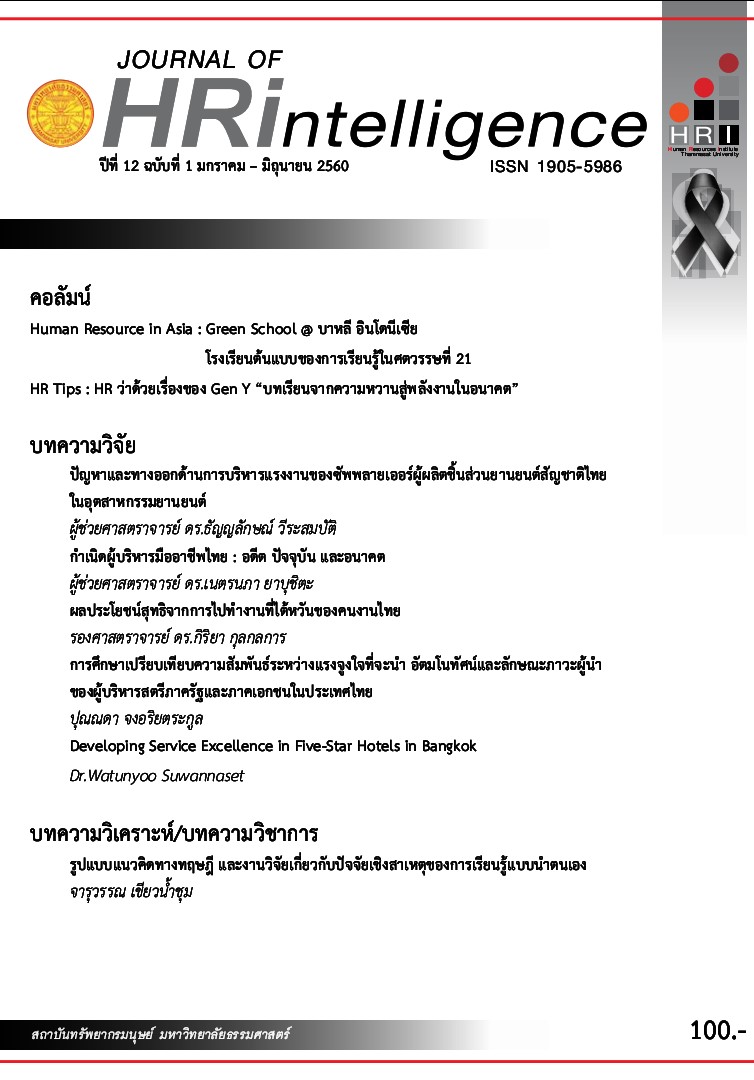รูปแบบแนวคิดทางทฤษฎี และงานวิจัยเกี่ยวกับปัจจัยเชิงสาเหตุของการเรียนรู้แบบนำตนเอง
Main Article Content
บทคัดย่อ
บทความนี้แบ่งออกเป็น 2 ตอน ตอนที่ 1 เป็นการประมวลรูปแบบแนวคิดทางทฤษฎีเกี่ยวกับการเรียนรู้แบบนำตนเอง ตอนที่ 2 เป็นการทบทวนงานวิจัยเกี่ยวกับปัจจัยเชิงสาเหตุของการเรียนรู้แบบนำตนเอง ในตอนที่ 1 เป็นรูปแบบแนวคิดทางทฤษฎีเกี่ยวกับการเรียนรู้แบบนำตนเองนั้น ได้จำแนกออกเป็น 3 กลุ่มแนวคิด คือ 1) รูปแบบแนวคิดเชิงเส้นตรง เป็นกลุ่มที่มีมุมมองการเรียนรู้แบบนำตนเองว่าเป็นกระบวนการเรียนรู้ที่เกิดขึ้นเป็นลำดับขั้น เริ่มจากขั้นหนึ่งไปสู่ขั้นต่อๆ ไป จนบรรลุเป้าหมายการเรียนรู้ 2) รูปแบบแนวคิดเชิงปฏิสัมพันธ์ เป็นกลุ่มที่มีมุมมองว่า การเรียนรู้แบบนำตนเองเกิดขึ้นจากปฏิสัมพันธ์ระหว่างองค์ประกอบภายในตัวผู้เรียน กับตัวแปรอื่นนอกตัวผู้เรียน และ 3) รูปแบบแนวคิดเชิงการเรียนการสอน ซึ่งมีมุมมองว่า การเรียนรู้แบบนำตนเองจะพัฒนาขึ้น ภายใต้การแสดงบทบาทและแนวทางการดำเนินการเรียนสอนของครูที่สอดคล้องกับการเรียนรู้ในแต่ละขั้น คือ ขั้นพึ่งพา ขั้นสนใจ ขั้นเข้าเกี่ยว และขั้นการชี้นำตนเอง ในตอนที่ 2 เป็นการทบทวนงานวิจัยเกี่ยวกับปัจจัยเชิงสาเหตุของการเรียนรู้แบบนำตนเองนั้น พบว่า ตัวแปรที่ส่งผลต่อการเรียนรู้แบบนำตนเอง มีทั้งตัวแปรจิตลักษณะภายในตัวผู้เรียนและปัจจัยแวดล้อมอื่นๆ นอกตัวผู้เรียน แต่อย่างไรก็ตาม ยังคงมีตัวแปรอีกมากที่อาจจะมีอิทธิพลต่อการเรียนรู้แบบนำตนเอง ซึ่งจะเป็นประเด็นของโจทย์วิจัยที่ควรศึกษาค้นคว้าต่อไป
Article Details
ขอมอบลิขสิทธิ์บทความที่ได้รับการตีพิมพ์ให้แก่สถาบันเสริมศึกษาและทรัพยากรมนุษย์ กรณีมีการฟ้องร้องเรื่องการละเมิดลิขสิทธิ์เกี่ยวกับภาพ กราฟ ข้อความส่วนใดส่วนหนึ่ง และ/หรือข้อคิดเห็นที่ปรากฎในบทความ ให้เป็นความรับผิดชอบของข้าพเจ้าและผู้เขียนร่วมแต่เพียงผู้เดียว
เอกสารอ้างอิง
จินตนา สุจจานันท์ .(2559). การรเรียนรู้ด้วยวิธีชี้นำตนเอง (self-directed Learning). สืบค้นเมื่อ15 มีนาคม 2559.จากวารสารอิเล็กทรอนิกส์ คณะศึกษาสตร์ มหาวิทยาลัยเชียงใหม่. เว็บไซต์ ejournal. edu.emu.ac.th /view.php? id_read=57.
วุทธิศักดิ์ โภชนุกูล. (2554). การเรียนรู้โดยชี้นำตนเอง (self-directed learning, SDL). สืบค้นเมื่อ 7 มีนาคม 2559. จาก www.Sittikan .blogspot.com/2011/12/self-directed- learning-sdl.html .
ศักรินทร์ ชนประชา .(2557). ทฤษฎีการรเรียนรู้ผู้ใหญ่:สิ่งที่ครูสอนผู้ใหญ่ต้องเรียนรู้. วารสารศึกษาศาสตร์ มหาวิทยาลัยสงขลานครินทร์ วิทยาเขตปัตตานี. 25 (2), 13-23.
สุธาสินี ใจเย็น. (2545). ตัวแปรที่เกี่ยวข้องกับความสามารถในการเรียนรู้ด้วยตนเองของนักศึกษาในโรงเรียนที่เปิดสอนระบบทางไกลในเขตบางเขน. กรุงเทพมหานคร. วิทยานิพนธ์ปริญญามหาบัณฑิต มหาวิทยาลัยศรีนครินทรวิโรฒ.
เสมอกาญจน์ โสภณหิรัญรักษ์. (2552). ปัจจัยการเรียนการสอนแบบผสมผสานที่ส่งผลต่อการเรียนรู้แบบนำตนเองของนักศึกษาปริญญาบัณฑิต. วิทยานิพนธ์ครุศาสตรมหาบัณทิต. จุฬาลงกรณ์มหาวิทยาลัย.
หทัยทิพย์ ภาคอินทรีย์. (2545). ปัจจัยที่มีความสัมพันธ์กับคุณลักษณะการเรียนรู้แบบนำตนเองของนิสิต คณะสัตวแพทยศาสตร์จุฬาลงกรณ์มหาวิทยาลัย. วิทยานิพนธ์ปริญญามหาบัณฑิต มหาวิทยาลัยศรีนครินทรวิโรฒ.
อาชัญญา รัตนอุบล. (2551). พัฒนาการ การเรียนรู้ และการจัดกิจกรรมสำหรับผู้ใหญ่. กรุงเทพมหานคร : สาขาวิชาการศึกษานอกระบบโรงเรียน ภาควิชานโยบาย การจัดการ และความเป็นผู้นำทางการศึกษา คณะครุศาสตร์.
Bonham, L.A. (1992). Major Learning efforts: Recent research and future directions. In G.J. Confessore And S.J.Confessore (Eds.) Guideposts to self-directed learning : Expert commentary on essential Concepts. King ofPrussia, P.A: Organization Design and Development, Inc.
Brockett, R.G., & Hiemstra, R. (1991). Self - Direction in Adult learning : Perspective on Theory, research, and practice.New York : Routledge.
Brookfield, S. (1986). Understanding and facilitating adult learning. San Francesco : Jossey-Bass.
Candy, P.C. (1991). Self - direction for lifelong learning: A comprehensive guide to theory and Practice, San
Francisco : Jossey-Bass.
Candy, P.C. (1992). The inquiring mind: A study of adult who continues to learning, Phillip.c. Candy on Cyril O.Houle.In G.J. Confessore and S.J. Confessore (Eds.), Guideposts to self-directed learning : Expert commentary onessential concepts. King of Prussia, P.A : Organization Design and Development, Inc.
Danis, C. & Tremblay, N.A. (1997). Propositions regarding autodidactic learning and their implications for teaching.Lifelong Learning : An Omnibus of Practice and Research.10 (7),
Faisal, M. & Eng, L. Ng. (2016). The Effect of Self-Directed Learning Tasks on Attitude towards Science. Retieved February 20, 2016 from www.iaea.info/documents/paper_paper_ 4d5283bb.pdf.
Francis, A., & Flanigian, A. (2012). Self-Directed Learning and Higher Education Practices : Implications for Student Performance and Engagement. International Journal of the Scholarship of Teaching and Learning, 7 (3),1-18.
Garrison, D.R. (1997). self-directed learning : Toward a comprehensive model. [Electronic Version]. Adult
EducationQuarterly, 48 (1), 18-33.
Grow.G.O. (1991). Teaching learners to be self-directed. Adult Education Quarterly, 41 (3), 125-149.
Grow, G.O. (1994). In defense of the Staged Self-directed Learning Model. Adult Education Quarterly, 44 (2),109-114.
Hammond, M., & Collins, R. (1991). Self-directed learning : Critical Practice. London : Kogan Page.
Holzer, M. (2002). The relationships among students' self -directed learning readiness, perceived self-efficacy, and self-assessment of task performance in a community college public speaking course. (3042958 Ed.D.),University of Central Florida, Ann Arbor. Retrieved MAY 3, 2016. From http://search.proquest.com/ docview/305440074?accountid=44783ProQuest Dissertations & Theses Global database.
Houle, C.O. (1961). The inquiring mind : A study of the adult who continues to learn. Madison, WI : The University of Wisconsin Press.
Huang, Mei-hui (Bonnie). (2008) Factors Influencing Self-directed Learning Readiness amongst Taiwanese Nursing Students. Ph.D. Thesis, Queensland University of Technology.
Kek, M., & Huijser, H. (2011). Exploring the combined relationships of student and teacher factors on learning approaches and self-directed learning readiness at a Malasian University. Studies in Higher Education, 36 (2),185-208.
Knowles, M.S. (1975). Self-directed Learning : A guide for learners and teachers. New York : Association Press.
Lai, C. (2013). Framework for developing self-directed technology use for language learning. Language Learning & Technology, 17 (2), 100-122.
Merriam, S.B. (2001). Andragogy and self-directed learning: pillars of adult learning Theory. New Direction for Adult and continuing Education. 89 (1), 3-13.
Merriam, S.B., & Caffarella, R.S. (1999). Learning in adulthood. (2nd edition). San Francisco: Jossey-Bass.
Ojo, D.O. & Olakulehin, F.K. (2006). Attitudes and Perceptions of Students to Open and Distance Learning In Nigeria. The International Review of Research in Open and Distributed Learning, 7(2), retrieved February 1,2016 from http://www. Irrodl.org/index.php/irrodi/ article/view/313/494
Rachal, J. (2002). Andragogy detectives : A Critique of the present and a proposal for the feature. Adult Education Quarterly, 52 (3), 220-227.
Roberson, D.N., & Merriam, S.B. (2005). The self-directed learning process of older rural adults. Adult Education Quarterly, 55 (4), 269-287.
Snarski, R. D. (2008). Teaching self-directed learning theory to enhance online course satisfaction : Preparing graduate level information technology students. (3320541 Ph.D.), Capella University, Ann Arbor. Retrieved January 30, 2016 from http://search.proquest.com/docview/ 304821858? accountid=44783 ProQuest Dissertations & Theses Global database.
Spear, G.E., & Mocker, D.W. (1984).The organizing circumstance : environmental determinants in self - directed learning, Adult Education Quarterly, 35 (1) 1-10.
Tough, A. (1968). Why adults learn. Monographs in Adult Education. No3. Toronto : The Ontario Institute For Studies in Education.
Tennant, M. (1992). The staged self-directed learning model. Adult Education Quarterly, 11 (1), 55-72.
Tennant, M. (2006). Psychology and Adult Learning. 3rd edition. New York : Routledge.
Teng, K. (. (2005). Perceptions of taiwanese students to english learning as functions of self - efficacy, motivation,learning activities and self -directed learning (Order No.3178892). Available from ProQuest Dissertations &Theses Global. (305003112). Retrieved march 15, 2016. from http://search.proquest.com/docview/ 305003112?Accouted=44783.
Tough, A. (1968). Why adults learn. Monographs in Adult Education. No3. Toronto: The Ontario Institute For Studies in Education.
Tsay, M.-H. (1999). Students' preferences for strategies to facilitate self-directed learning in distance education in Taiwan. Ph.D. thesis, Colorado State University
Wheeler, J.V. (2008).The impact of social environment on emotional, social, and cognitive competency development. Journal of Management Development, 27 (1), 129-145. database.


